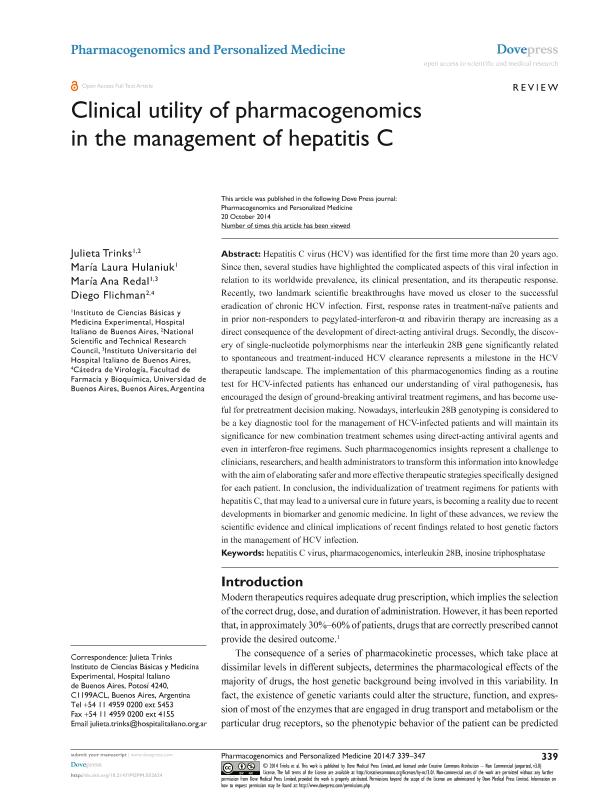Mostrar el registro sencillo del ítem
dc.contributor.author
Trinks, Julieta

dc.contributor.author
Hulaniuk, María Laura
dc.contributor.author
Redal, María Ana
dc.contributor.author
Flichman, Diego Martin

dc.date.available
2017-12-12T19:06:56Z
dc.date.issued
2014-10
dc.identifier.citation
Trinks, Julieta; Hulaniuk, María Laura; Redal, María Ana; Flichman, Diego Martin; Clinical utility of pharmacogenomics in the management of hepatitis C; Dove Press; Pharmacogenomics and Personalized Medicine; 7; 10-2014; 339-347
dc.identifier.issn
1178-7066
dc.identifier.uri
http://hdl.handle.net/11336/30319
dc.description.abstract
Hepatitis C virus (HCV) was identified for the first time more than 20 years ago. Since then, several studies have highlighted the complicated aspects of this viral infection in relation to its worldwide prevalence, its clinical presentation, and its therapeutic response. Recently, two landmark scientific breakthroughs have moved us closer to the successful eradication of chronic HCV infection. First, response rates in treatment-naïve patients and in prior non-responders to pegylated-interferon-α and ribavirin therapy are increasing as a direct consequence of the development of direct-acting antiviral drugs. Secondly, the discovery of single-nucleotide polymorphisms near the interleukin 28B gene significantly related to spontaneous and treatment-induced HCV clearance represents a milestone in the HCV therapeutic landscape. The implementation of this pharmacogenomics finding as a routine test for HCV-infected patients has enhanced our understanding of viral pathogenesis, has encouraged the design of ground-breaking antiviral treatment regimens, and has become useful for pretreatment decision making. Nowadays, interleukin 28B genotyping is considered to be a key diagnostic tool for the management of HCV-infected patients and will maintain its significance for new combination treatment schemes using direct-acting antiviral agents and even in interferon-free regimens. Such pharmacogenomics insights represent a challenge to clinicians, researchers, and health administrators to transform this information into knowledge with the aim of elaborating safer and more effective therapeutic strategies specifically designed for each patient. In conclusion, the individualization of treatment regimens for patients with hepatitis C, that may lead to a universal cure in future years, is becoming a reality due to recent developments in biomarker and genomic medicine. In light of these advances, we review the scientific evidence and clinical implications of recent findings related to host genetic factors in the management of HCV infection.
dc.format
application/pdf
dc.language.iso
eng
dc.publisher
Dove Press

dc.rights
info:eu-repo/semantics/openAccess
dc.rights.uri
https://creativecommons.org/licenses/by-nc/2.5/ar/
dc.subject
Hepatitis C Virus
dc.subject
Il28b
dc.subject
Inosine Triphosphatase
dc.subject
Pharmacogenomics
dc.subject
Interleukin 28b
dc.subject.classification
Bioquímica y Biología Molecular

dc.subject.classification
Medicina Básica

dc.subject.classification
CIENCIAS MÉDICAS Y DE LA SALUD

dc.subject.classification
Gastroenterología y Hepatología

dc.subject.classification
Medicina Clínica

dc.subject.classification
CIENCIAS MÉDICAS Y DE LA SALUD

dc.title
Clinical utility of pharmacogenomics in the management of hepatitis C
dc.type
info:eu-repo/semantics/article
dc.type
info:ar-repo/semantics/artículo
dc.type
info:eu-repo/semantics/publishedVersion
dc.date.updated
2017-12-12T18:36:50Z
dc.journal.volume
7
dc.journal.pagination
339-347
dc.journal.pais
Reino Unido

dc.journal.ciudad
Manchester
dc.description.fil
Fil: Trinks, Julieta. Hospital Italiano. Instituto de Ciencias Básicas y Medicina Experimental; Argentina. Consejo Nacional de Investigaciones Científicas y Técnicas; Argentina
dc.description.fil
Fil: Hulaniuk, María Laura. Hospital Italiano. Instituto de Ciencias Básicas y Medicina Experimental; Argentina
dc.description.fil
Fil: Redal, María Ana. Hospital Italiano. Instituto de Ciencias Básicas y Medicina Experimental; Argentina
dc.description.fil
Fil: Flichman, Diego Martin. Universidad de Buenos Aires. Facultad de Farmacia y Bioquímica. Departamento de Microbiología, Inmunología y Biotecnología. Cátedra de Virología; Argentina. Consejo Nacional de Investigaciones Científicas y Técnicas; Argentina
dc.journal.title
Pharmacogenomics and Personalized Medicine
dc.relation.alternativeid
info:eu-repo/semantics/altIdentifier/doi/http://dx.doi.org/10.2147/PGPM.S52624
dc.relation.alternativeid
info:eu-repo/semantics/altIdentifier/url/https://www.dovepress.com/clinical-utility-of-pharmacogenomics-in-the-management-of-hepatitis-c-peer-reviewed-article-PGPM
dc.relation.alternativeid
info:eu-repo/semantics/altIdentifier/url/https://www.ncbi.nlm.nih.gov/pmc/articles/PMC4222698/
Archivos asociados
